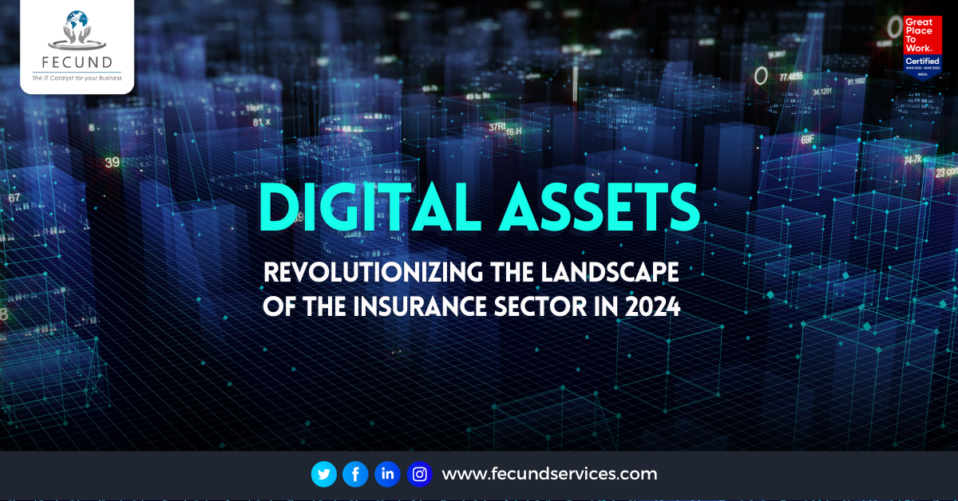
The insurance sector is predicted to be the next field in the market to experience a paradigm shift after the trade market. It is difficult for the leaders in this sector to cope with the dynamic consumer behaviour, moderate interest rates, subdued premium rates, etc.
However, artificial intelligence has been growing exponentially in the insurance sector and resolving these issues one by one. Even though this sector has seen its fair share of catastrophes due to ancient methods of functioning, AI has the potential to lift up the insurance market.
Artificial intelligence is expected to deliver on industry predictions through deep learning and machine learning. In today’s world, there are several insurance tech companies that are leveraging AI to gain more success in the market.
The only challenge today’s leaders in the insurance industry face is to identify feasible and valuable applications of AI. They must put their attention to bridging the gap between understanding this technology’s working mechanism and its business value propositions.
Artificial intelligence has been transforming the insurance industry by allowing them to adopt digital technologies such as:
● GPS Sensing software
● Bot Based Service System
● Pay as you go Commerce
● Automated Business Processes
Some of the technologies that AI uses to function are:
Machine Learning: Teaching computers to understand patterns in complex data and predict outcomes. This technology is the foundation of all the other features that artificial intelligence offers.
Deep Learning: It is a model of machine learning where the computer can analyze data and draw conclusions. It helps solve problems without giving explicit instructions or a framework.
Neural Network: An algorithm designed to mimic the human brain and recognize patterns in data. It helps identify, analyze and classify data that is too complex for the human brain to fathom.
Natural Language Processing: It is a common feature used by chatbots on several insurance websites and applications. It allows computers to understand, interpret and respond in text or voice to the customers.
AI Application In Insurance Industry
According to towardsdatascience.com, “Artificial Intelligence (AI) has become a buzzword in the insurance industry. Still, the industry has made significant progress in AI implementation, although we are still in the early days.”
There are several well-established insurance companies that claim their software uses machine learning to write policies according to the compiled data. AI allows insurers to understand what the potential insured wants and helps them grow their business.
Digital technologies in the form of artificial intelligence have been in use by insurers since Nasdaq established a secure network of trading desks for integrated customer data records. AI has been used to record punch cards, basic computing systems, etc.
AI can be used in the insurance industry with the following applications:
● Analyze sudden disaster caused damage
● The calculation for risk tolerance
● Transactional analysis for banks and financial organizations
● Risk calculation, rate analysis based on customer data.
How AI is shaping the insurance sector
Data compiled through artificial intelligence technology allows insurers to identify trends and act accordingly. The disruption in the flow of the market by COVID-19 has changed how the insurance sector sees artificial intelligence and the solutions it provides.
These are the four trends coupled with AI that are set to change the insurance industry for sure.
Cognitive Technology Advancement
Current AI technologies such as neural networks and deep learning which are used for image, voice, and unrefined data processing are being evolved in a wide variety of applications.
These technologies are slowly becoming the standard protocol for processing large piles of complex data streams, that will be generated by insurance products running with the clients and recording their behavioral patterns.
As these technologies are being increasingly commercialized, consumers/ carriers will have the opportunity to gain access to devices that are constantly learning and adapting to the world around them. This enables insurers to create highly customized policies based on the consumer’s unique pattern and increase engagement techniques.
Data Explosion from connected devices
Suppose a guy damages his car in an accident. His personal assistant instructs him to take pictures of the car from the front, from the sides, and the surroundings. By the time he reaches back into his seat, the insurance application informs him that his claim has been approved and a remote drone has been dispatched to the spot for inspection.
The owner of the car did not even have to go anywhere and his claim was approved before even leaving the site of the incident.
As the world is moving towards a more digitized industry, the number of connected consumer devices is increasing significantly. Car monitors, fitness trackers, home assistants, smartphones, and smartwatches are allowing insurance companies to rapidly increase access over the carrier’s life.
According to mckinsey.com, experts have estimated there will be up to one trillion connected devices by 2025. This allows the insurers to understand their customers better and create new product categories, more personalized pricing, and improved real-time delivery.
Improved Product Development
As AI is branching its roots into the insurance industry, it is expected to become the foundation of new insurance products along with advanced analytics. By adding AI to this equation, it allows new features to be constantly added to this iterative process.
It creates a flexible building block foundation that keeps evolving. Another advantage that this model provides is that it gives the insurers more leverage by analyzing the data provided by customers via monitoring devices such as fitness trackers. It creates a dramatic shift in people’s behaviour and demands which do not follow traditional models.
AI also allows insurance companies to collect data based on region and jurisdiction. This allows the insurer to analyze and evaluate the customer data and create more customized products based on them.
This saves the company hundreds of man-hours and creates more customized policies which the customer can connect with and purchase.
Conclusion:
AI has the ability to enhance the experience of customers in the insurance industry. As AI grows into the insurance sector, we can see insurance become more personalized and tailored to every individual’s needs. You will also discover new revenue streams as AI-driven analysis will bring new business opportunities.
Anant Kumar

Technically and tactically proficient Team Lead with a demonstrated history of working in the information technology and services industry.




Post a comment